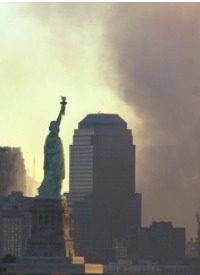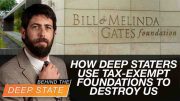
As the Decade That Has No Name (The “aughts”? The “zeroes”? The “naughty naughts”?) draws to a merciful close, we would do well to consider what a difference 10 years have made. A decade is as arbitrary a unit of time as any, but, as the rough equivalent of half a generation, is long enough to discern longer-term trends, in a way that a year or even five years probably is not.
Without question, the closing decade has been the most calamitous since the 70s, and in many respects, has paralleled the tumultuous span that saw the Vietnam War, the Nixon impeachment, and the oil embargo. If the seventies saw a string of gargantuan natural disasters — the great earthquake in Tangshan, China, in 1976, for example, which is believed to have claimed nearly 800,000 lives, as well as the 1970 cyclone that killed 500,000 in East Pakistan (now Bangladesh) and the Indian state of West Bengal — the 00s saw the shocking Indian Ocean tsunami, Hurricane Katrina, and a number of other unusually destructive earthquakes.
If the 70s was a decade of severe recession and economic malaise, at least from 1974 onward, this one staged the worst economic downturn since the Great Depression. If U.S. foreign policy in the ‘70s was framed by a military adventure-turned-Asian quagmire (Vietnam), we give you Iraq and Afghanistan, both still ongoing after 8 years. And if the seventies saw the first explosion of sensational acts of international terrorism, like the infamous Munich Massacre – need we continue?
What the ‘70s did not see – and what America has not seen, since the 1930s, until this decade – was a wholesale revolution in government, a fundamental transformation in the relationship between citizen and state, especially the federal government. This despite all of the social and cultural upheavals associated with the then-nascent counterculture.
What a difference thirty years have made! For the signal political events of this decade — the terrorist attacks of 9-11 and the ongoing economic crisis — have provoked a thoroughgoing legal transformation in our country. Almost overnight, Americans have largely come to accept the newly published powers of the federal government — as embodied in the Orwellian Department of Homeland Security — to watch, snoop, harass, keep tabs on, and, in some circumstances, detain, and imprison without a warrant or ordinary legal recourse those suspected of involvement in terrorist activities. We are now being asked to accept an entirely new level of federal government intrusion into economic and financial activity, within a new regulatory framework in which all economic activities will be monitored and financial privacy will be a thing of the past. And as a bonus, long threatened legislation to complete the socialization of American medicine is nearing completion.
All of these are part of a troubling, trans-generational trend to use government, and particularly the federal government, to fix all problems. But unfortunately, what began with the misleadingly benign, avuncular Big Government of the New Deal (Who could forget the smiling government agent saying to Henry Fonda’s Tom Joad in Grapes of Wrath, “I’m from the government, and I’m here to help you”!) has — as it inevitably must — morphed into something rather more menacing and far more difficult to control. Ten years ago, we could board airplanes without removing our shoes or having to tiptoe meekly past airport security personnel empowered to detain and interrogate us arbitrarily. No one back then was tapping our phones without a court order or monitoring our email or even our library borrowing habits. Police were not in the habit of using tasers on unarmed, nonaggressive civilians during routine traffic stops.
Hand in hand with the explosion of government power has been the mushrooming of public debt at every level of government. Americans were alarmed enough at the beginning of this decade, when the federal government debt burden was roughly $ 5.6 trillion and 58 percent of the GDP. Today it stands at an estimated $12.8 — 90 percent of the GDP. Next year, the gross debt is expected to surpass, for the first time since such records have been available, 100 percent of the GDP — and all of these figures, we might add, are conservatively reckoned.
The great economic contraction that began in this decade is likely to continue well into the next, with the eventual collapse of the dollar, hyperinflation, and a fiscal crisis of epic proportions as the United States government finds itself unable to redeem its vast obligations all likely outcomes during the next ten years. So also is the bankruptcy of many state governments, which are so strapped for cash that the recent spate of heavy snowstorms has left state legislatures scrambling to find the money to pay for winter road maintenance.
By every political and economic metric, this decade appears to have set the stage for an epic national crisis soon to come. At the same time, some of the trends of recent years give ample grounds for optimism that, if America can weather the coming economic and political storms, a revival of freedom and reverence for constitutional government may be in the offing.
For one thing, there is the miraculous Internet which, warts and all, has transformed America’s access to information. The old opinion-molding Establishment media cartels of the past have been, if not staked through the heart, at least severely undercut by the myriad of enterprising bloggers, independent news sites, cell-phone videographers at political rallies, and websites — like this one — that, for minimal cost, spread the sweet doctrines of freedom far and wide.
It is no stretch to assert that the most surprising political event of the decade, the presidential campaign of Ron Paul with its unprecedented success raising cash and awareness of issues via online media like YouTube, would not have been possible prior to the Internet, given the stranglehold of the media Establishment over the flow of information.
In general, freedom in the sense that the Founders understood it is very much coming back into vogue, as witness the explosive popularity of bestselling books by the likes of Ron Paul and Thomas Woods, the sudden widespread interest in the once-ignored Federal Reserve, and the startling rolling back of many gun control laws, especially at the state level, over the last few years. Though the cultural disconnect between America’s self-anointed elites both inside and outside the Beltway and the rest of us is as stark as ever, the smug self-assurance among the former is lost. The Powers That Be, it seems, are apprehensive that their time is running out. From energetic college students embracing freedom to older folks whose eyes have only recently been opened by some signal event — the Ron Paul campaign, the bailout brigade, or whatever — there is every reason to believe that the spirit of liberty, which for generations appeared to be slumbering in America, has awakened in this first decade of a brand-new millennium.
We may therefore be guardedly optimistic that, although the new decade may feature great tribulations both economic and political, the seeds of which have been sown over decades of political misconduct, the future of American liberty is very bright in the long run.
Ten years from now, the picture will surely be clearer.
Photo: AP Images



